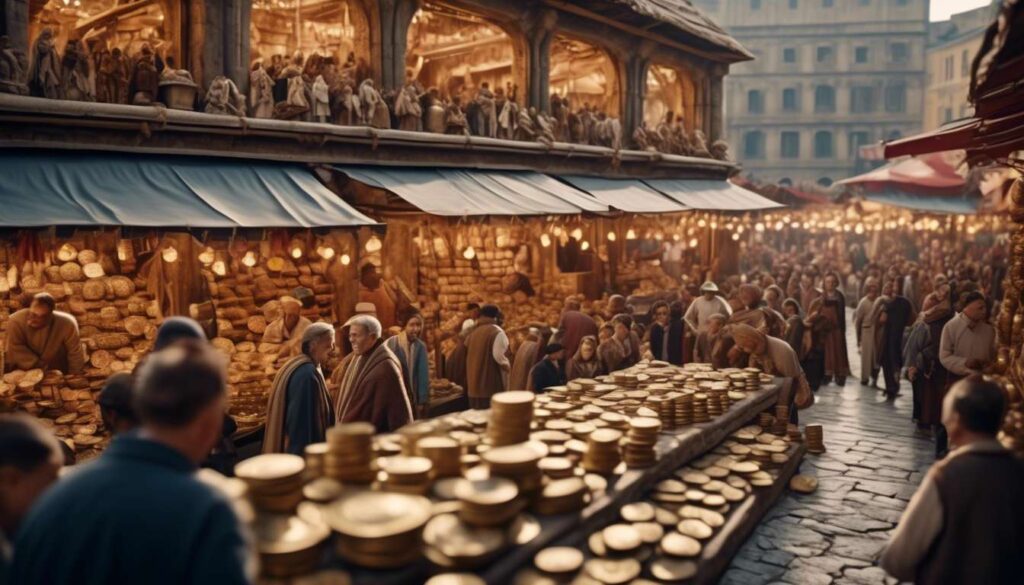Sports betting has captivated audiences globally, boasting a rich and complex history. To understand its origins, we must embark on a journey through time, exploring the beginnings of this intriguing practice.
Ancient Civilizations:
- The earliest records of sports betting trace back to ancient civilizations such as the Greeks and Romans, who placed wagers on athletic contests and gladiator games.
- In China, bets were often placed on animal fights, notably involving roosters and crickets.
Middle Ages:
- During the Middle Ages, sports betting continued to evolve, with knights and nobles wagering on jousting tournaments and horse races.
Renaissance and Enlightenment:
- The Renaissance period saw the emergence of organized sports, with betting becoming more structured.
- This era also witnessed the establishment of horse racing as a popular betting sport in England.
19th and 20th Centuries:
- The 19th century introduced modern sports betting, with the advent of bookmakers and betting shops.
- In the 20th century, the rise of professional sports leagues and events, such as the Olympics and the World Cup, further popularized sports betting.
Modern Day:
- Today, sports betting is a global phenomenon, influenced by technological advancements and the internet.
- Online betting platforms and mobile apps have made placing bets more accessible than ever before.
Cultural and Economic Impact:
- Sports betting has significantly shaped, and been shaped by, cultural practices worldwide.
- Economically, it represents a multi-billion-dollar industry, with both positive and negative societal impacts.
By examining historical records and cultural practices, we gain insight into how sports betting has evolved across continents and eras. This exploration reveals humanity’s enduring love for competition and chance, highlighting how sports betting has been interwoven with centuries of human innovation and interaction.
Ancient Origins
Sports betting dates back to ancient civilizations, where people placed wagers on the outcomes of events like chariot races and gladiator contests. It was more than just a pastime; it was a way for communities to come together and share in the thrill of chance and fortune.
Horse racing became one of the earliest forms of organized sports popular for betting. Imagining the scene, we can see crowds gathering around dusty tracks, watching majestic horses compete. Bookmakers—our early counterparts—played a crucial role in this setting.
Bookmakers acted as intermediaries who facilitated bets and ensured the fairness of outcomes. They calculated odds and determined payouts, making them integral to the betting process.
The ancient practices of sports betting laid the groundwork for our modern sports betting culture. Through shared experiences and common rituals, our ancestors found a sense of belonging. This sense of unity continues to bring people together today in the world of sports gambling.
Greek and Roman Influence
Throughout history, the Greeks and Romans significantly shaped the evolution of sports betting by integrating it into their vibrant athletic and gladiatorial events. They brought communities together, igniting a shared excitement and sense of camaraderie.
In ancient Greece:
- Gambling was often seen at the Olympic Games.
- Spectators placed bets on their favorite athletes.
- This practice fostered a collective spirit, binding people through anticipation and triumph.
The Romans elevated this tradition to new heights with their grand arenas and spectacles:
- Horse racing became a focal point for betting among Roman citizens.
- Bookmakers emerged as pivotal figures, facilitating wagers and ensuring fair play.
- They played essential roles in gathering crowds and enhancing the experience.
Together, the Greeks and Romans didn’t just advance sports betting; they created a cultural phenomenon that united people in joy and competition, laying the groundwork for today’s betting practices.
Chinese Betting Practices
In China, centuries-old betting traditions on games like mahjong and lotteries have significantly shaped the cultural landscape and continue to influence modern practices. These activities foster a sense of community, allowing individuals to connect over shared hopes and dreams. Gambling in this context isn’t solely about chance; it is about bonding and being part of something larger than oneself.
Horse racing serves as another staple of Chinese betting and holds a special place in the hearts of many. The thrill of watching horses thunder down the track unites people in anticipation, creating a shared experience.
- Bookmakers play an essential role in this tradition by:
- Offering odds
- Facilitating wagers
- Helping navigate the complexities of betting
These elements make betting accessible and engaging for everyone involved.
As people gather around games and races, there’s a sense of belonging that transcends the individual. Whether placing bets or simply soaking in the atmosphere, these practices remind participants of their shared heritage and the enduring joy of coming together as a community.
Medieval Wagering
During the medieval period, people actively engaged in wagering on various events, from knightly tournaments to everyday games of chance. We found camaraderie in the thrill of gambling, whether it was betting on the outcome of a joust or the roll of dice.
This sense of community, built around shared excitement and risk, drew us together across social strata, creating bonds that transcended wealth and status.
Horse racing emerged as a popular pastime, with nobles and commoners alike gathering to place bets on their favored steeds. Bookmakers played a crucial role in these events, facilitating the wagers and ensuring fair play. They quickly became central figures in the betting world, trusted to manage the stakes and payouts with integrity.
As bookmakers, we became part of a trusted network, bringing a sense of order to the chaos of chance. Together, through gambling, we found a shared language and a collective thrill that defined our medieval experience.
Renaissance Developments
During the Renaissance, we witnessed a significant evolution in sports betting as it became more structured and widespread across Europe. Gambling gained a reputable status and became an integral part of social gatherings and community life. The thrill of wagering drew people closer, fostering a sense of belonging and shared excitement.
Horse racing emerged as a particularly popular sport for betting during this era. It wasn’t just a pastime; it became a vibrant spectacle that brought communities together. The races provided an opportunity for people from all walks of life to engage in the excitement by:
- Sharing in the joy of winning
- Enjoying the camaraderie of the experience
Bookmakers played a crucial role in shaping the betting landscape. They offered organized platforms for placing bets, making the process more accessible and engaging for everyone involved.
Their presence ensured that betting was:
- Entertaining
- A fair and regulated activity
This enhanced the trust and unity within communities, solidifying betting as a reputable and enjoyable part of Renaissance life.
Horse Racing Evolution
Over the centuries, horse racing has evolved from informal local competitions into a sophisticated and widely celebrated sport. It’s a journey we’ve traveled together, shaping not only a thrilling pastime but also a vibrant community where the passion for speed and strategy intertwines.
Horse racing’s transformation has been a spectacle of tradition meeting innovation, where each race tells a story of dedication and prowess.
As spectators, we haven’t just watched from the sidelines. We’ve participated in the thrill of gambling, turning horse racing into an exciting venture filled with anticipation and camaraderie. The shared excitement of betting on our favorite horses brings us together, reinforcing our sense of belonging in this grand sporting tradition.
While the horses gallop towards the finish line, our hearts race with them, driven by the thrill of potential victory. We’ve seen how the evolution of horse racing has paved the way for engaging experiences, where the stakes are high and the community spirit thrives.
Emergence of Bookmakers
In the vibrant world of sports betting, bookmakers play a crucial role in shaping the betting landscape. As a community of enthusiasts and bettors, we can trace the roots of modern gambling to the thrilling days of horse racing.
Bookmakers emerged as pivotal figures, bridging the gap between the gambler’s aspirations and the unpredictable outcomes on the racetrack. They didn’t just facilitate bets; they offered odds, managed stakes, and ensured fair play, creating a structured environment that appealed to our collective sense of thrill and belonging.
Horse racing, with its fast-paced excitement, provided the perfect backdrop for bookmakers to thrive. They brought order to the chaos, making it possible for us to engage in an activity that combined strategy and chance.
As we placed our bets, shared in the anticipation, and celebrated victories, bookmakers became indispensable to our shared experience. Together, we’ve built a community where the spirit of gambling is alive and well.
Modernization and Technology
In recent years, sports betting has undergone a remarkable transformation driven by advancements in technology and digital platforms. The traditional landscape of gambling, especially in horse racing, has evolved dramatically.
Today, we can place bets with just a few taps on our smartphones, connecting us with a global community of enthusiasts who share our passion. This sense of belonging enriches our experience, drawing us closer to the action and each other.
Bookmakers have embraced technology, offering more dynamic and interactive ways to engage with our favorite sports. Key features now available include:
- Live betting
- Real-time odds
- Detailed analytics
These tools are at our fingertips, enhancing our understanding and enjoyment of the games we love. We’ve moved beyond the physical limitations of betting shops, entering a digital realm where information flows seamlessly and opportunities abound.
As we navigate this modern era of sports betting, we continue to build connections and foster a shared excitement. This is fueled by innovation and the timeless thrill of the gamble.
Conclusion
Sports betting has a long and diverse history, with roots stretching back to ancient civilizations like the Greeks, Romans, and Chinese. The practice has evolved over centuries, reflecting the timeless human fascination with competition and chance.
Key historical developments in sports betting include:
-
Ancient Times:
- The Greeks and Romans engaged in betting on athletic competitions and gladiator events.
- The Chinese are believed to have engaged in early forms of betting.
-
Medieval Period:
- Wagering became a popular pastime, often associated with various forms of sports and jousting tournaments.
-
Emergence of Bookmakers:
- Bookmakers began to formalize the practice, setting odds and facilitating bets, which helped to organize and legitimize sports betting.
-
Modern Technological Advancements:
- The advent of the internet and mobile technology has revolutionized sports betting, making it more accessible and widespread.
While the exact originator of sports betting may be unclear, its popularity and widespread appeal continue to thrive in today’s world, highlighting the enduring allure of betting on the outcomes of competitive events.

